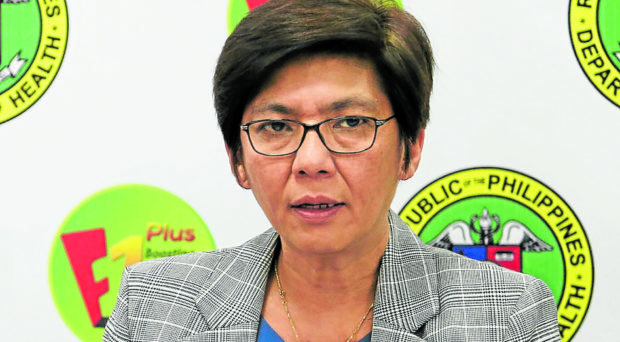MANILA, Philippines — The COVID-19 Omicron variant, which is the latest variant of concern for its supposed increased transmissibility, is not a product of any laboratory work or government effort to justify vaccinations, a Department of Health (DOH) official clarified on Wednesday.
According to DOH Undersecretary Maria Rosario Vergeire, it is natural for viruses to mutate especially if it has been transferred from one host to another — just like what happened with other variants like Alpha, Beta, Theta, and more recently, Delta.
Vergeire said this during ABS-CBN Teleradyo’s On the Spot, after a viewer asked if the Omicron was just meant to drive vaccination statistics up.
“Ito pong Omicron variant, hindi po ito gawa-gawa ng gobyerno, hindi rin po ito gawa-gawa ng mga tao across the globe. Ang virus po na SARS-CoV-2 na nagko-cause ng COVID-19, dahil siya ay virus, meron ho silang angking characteristic na they mutate as long as they have a host,” she explained.
(This Omicron variant, this is not the work of governments. This is also not the work of people across the globe. The SARS-CoV-2 virus which causes COVID-19, because it is a virus, they have the characteristic to mutate as long as they have a host.)
“So ngayon po, ito pong mga virus na ito na meron tayo ngayon for COVID, nag-mutate na siya ng ilang beses, nagkaroon na po tayo ng Alpha variant, Theta variant, Delta variant, at ngayon, lumabas po ‘yong Omicron variant. At ngayon po may nakapasok na rin sa ating bansa,” she added.
(So now, these viruses that we have for COVID, they have already mutated a couple of times, we already had the Alpha variant, Theta variant, Delta variant, and now, the Omicron variant emerged. And it is also now inside our country.)
Vergeire insisted that mutating viruses are natural. However, she also clarified that the government is really intent on bringing vaccination rates up even more, because the goal is to protect people from allegedly more infectious variants like the Omicron.
“Hindi po ito purposively prinoduce ng kahit na sino, this is an act of nature. So ‘yon pong ating pagbabakuna para maitaas natin ang antas ay hindi po related dya’n,” she said.
(This was not purposely produced by anyone, this is an act of nature. So our yearning to increase vaccinations is not related to that.)
“Pero kaya natin tinataas ang antas ng pagbabakuna natin at pinu-push po natin na ma-reach natin ‘yong target natin dahil gusto natin ma-proteksyunan tayo dito sa mga variants na lumalabas ngayon because of the natural behavior of these viruses,” she added.
(But the reason why we are increasing the status of vaccination and why we are pushing to reach the target is because we want to provide some sort of protection against the emerging variants, which is because of the natural behavior of these viruses.)
Last Monday, DOH confirmed the third case of Omicron variant in the country, that of a returning Filipino who already tested negative for COVID-19. This brings the current number to three — all of which were inbound cases, including those who came from Japan and Nigeria.
Currently, the country has seen a continuous decrease in COVID-19 infections per day, and the active infection count. DOH said on Tuesday that active cases are only at 9,384, as only 168 new cases were recorded, while 372 patients recovered.
This has been attributed to high vaccination rates in places of convergence: as of Tuesday, 44.2 million individuals in the country are fully vaccinated against COVID-19.
However, experts have warned of a possible spike in cases before the year ends or by early January if the Omicron variant is not kept in check, and if observance of health protocols fall by 30 percent.
During his late Tuesday night briefing, President Rodrigo Duterte expressed worry about a possible surge of COVID-19 cases again due to the Omicron variant, as the government’s coffers have been depleted due to disaster response.
